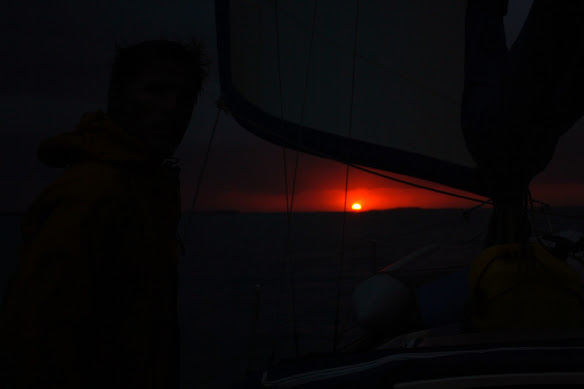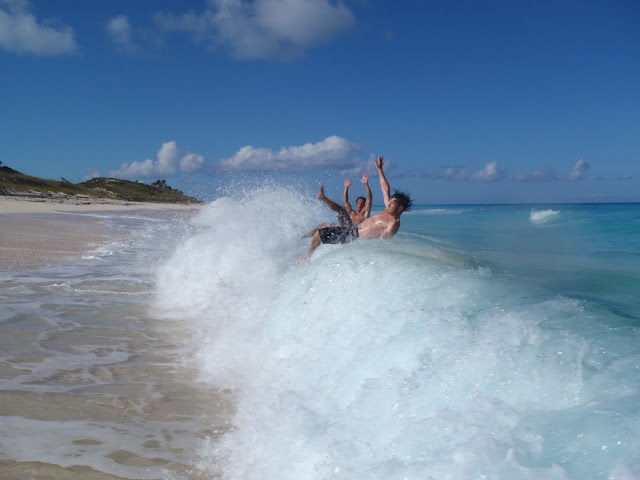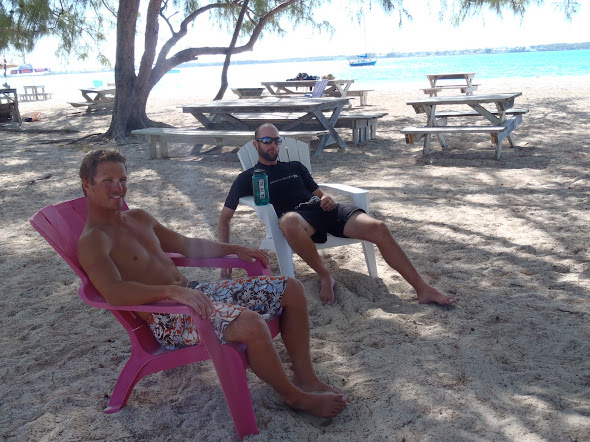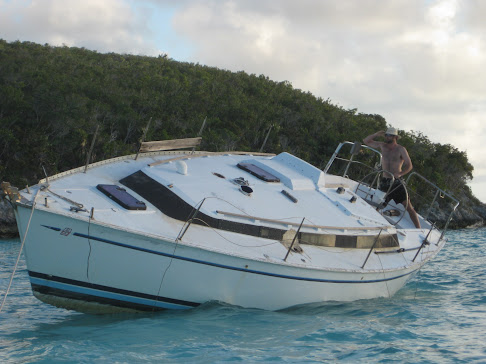 |
| (sunset at sea) |
From Georgetown we made for Calabash Bay on Long Island's northern tip, the place we'd failed to reach during our ill-timed prior attempt. We dropped anchor that night in the protected waters of the bay, as much for a swim as to get a full night's sleep. With no shower stall aboard, regular dips in the ocean took on an added importance, especially with four cold weather people squeezed together on such a little boat in the tropical heat.
 |
| (Nate cooks dinner with plenty of Old Bay seasoning) |
Our plan was then to head due east from the tip of Long Island to reach Rum Cay. I liked the name. Also, we had been strenuously advised in Georgetown that the snorkeling there was fantastic and, with the aid of a net and some gloves, we would eat rock lobster there until we could eat no more. Sounded good. I might not know how to fillet a fish, but I know how to cook lobster: boil until it stops screaming, smother in butter, open with crescent wrench.
 |
| (Mark updating his journal) |
The next morning, we found that the wind had begun to round on us in the night and was continuing to do so steadily. Soon, it was out of the east again and making the twenty miles into a headwind to reach Rum Cay before dark was out of the question. If we couldn't arrive before dark, we couldn't snorkel. If we couldn't snorkel, we couldn't hunt lobster. We turned off and headed south for Clarence Town, 35 miles away. We wouldn't arrive there before dark either but it was the direction we had to go anyway and we could ride out the next incoming weather front in the safety of its harbor.
Cruising south through the deep ocean waters of Long Island's eastern shore was the time to be trolling a lure. Out it went. Within an hour we had a 33 inch Dorado (Dolphin Fish, Mahi Mahi) on the line. Mark reeled it in and, by doing so, won the right to clean it. It was the first fish caught with a reel since Nate had put us out of commission in the Biminis. It caused quite a stir on deck.
 |
| (Hauling in the sea's bounty) |
With much shouting and cheering, Nate and Mark brought the fish aboard. Nate had been at the helm but abandoned that duty when he was distracted by the fish. Becca had the presence of mind to take over. All other attention was focused on the giant fish thrashing about with a multi-hook lure dangling from its mouth. As we watched well out of range, the Dorado (Becca named him Jerry) slowly quieted down. Nate got back to steering, and we other three remained perched on the cockpit benches in a semi circle, staring down silently, waiting for Jerry to die. He did, eventually, of natural causes.
Once Jerry was dead, Mark gave him a few exploratory pokes to be sure. It was now time to fillet. Becca brought out her cook book with the how-to-fillet pictographs. I retrieved the fillet knife from its place in the galley. Mark remained on deck, practicing breathing exercises and mentally preparing himself for the task ahead.
When all was ready, Mark made the first incision. The next forty-five minutes were at once wonderful and horrible and terribly bloody. Mark squatted bare chested on the cockpit floor, bathed in sweat and Dorado blood, perfectly still except for his hands, the very picture of quiet concentration. Becca and I hovered above him, dancing on the benches, shouting encouragement and suggestions, gesturing wildly. It was exhausting. By the time Mark was finished, we were too emotionally drained to help clean up.
Mark did a pretty good job for his first time and we got four big fillets that we bagged and stuffed in the frig until calmer conditions prevailed. The boat, at that time, was rolling pretty dramatically in the open ocean swells.
We didn't arrive in Clarence Town until after 1 a.m. Becca was asleep so Nate, Mark and I brought the boat in under sail, shooting the cut through its barrier reef in the dark with the aid our chartplotter and a careful lookout at the bow. The harbor was empty so we found an anchorage quickly. It was late, the latest we'd stayed up since Nassau, but we were once again in a safe harbor with nowhere to go for a few days. Out came the wine. There, in the middle of the night, on the deck of our stout little boat, awash in Bahamian starlight, we sipped our box wine with a sighs of pleasure and relived Mark's great fight with the fish.















































